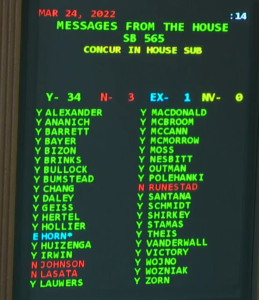MUCC applauds bipartisan funding for Michigan parks
On Thursday, the Michigan Senate passed a bipartisan, multi-billion dollar appropriations agreement on infrastructure, including a historic one-time expenditure in Michigan’s State and local parks.
The supplemental package included $450 million in federal coronavirus relief funds to support state and local parks across Michigan: $200 million will be appropriated to local parks and recreation project s; $65 million will be in the form of local parks and recreation grants; and the remaining $250 million is appropriated to “develop, improve, repair, and maintain state parks, state recreation areas, and state-designated trails.”
The package now heads to Governor Whitmer’s desk for her signature. This historic investment would be nearly the entire 2021-2022 fiscal year appropriations for the Department of Natural Resources (DNR), which was $464.4 million.
Michigan United Con s ervation Clubs (MUCC) is thrilled with this historic investment in Michigan’s parks, according to Executive Director Amy Trotter, but will continue to fight for any way to continue to improve Michigan’s outdoor places.
“We are over the moon about this historic investment in Michigan’s state and local parks,” said Trotter. “While this funding is not everything we asked for, it still
 provides for a once in a lifetime opportunity to upgrade our state and local parks in a way we haven’t had in a generation.”
provides for a once in a lifetime opportunity to upgrade our state and local parks in a way we haven’t had in a generation.”
The full breakdown of the package from the House Fiscal Agency can be viewed here . The bill text can be found here .
Earlier in the week, MUCC and partner organizations and individuals distributed a letter to all legislators in both houses urging action on a trio of senate bills providing over $1 billion in funding to state and local parks, as well as fully funding the State Park Endowment Fund up to its constitutional cap. This supplemental appropriation will replace those bills and the full funding of SPEF was not included at this time.
Sen. John Bumste ad (R-Newaygo), who chairs the Senate Appropriations Subcommittee on Natural Resources and Environment, Great Lakes and Energy, championed the bill’s passage as a much-needed resource for both the state and his district.
“The historic funding we approved today will make transformative changes to ensure the long-term health and viability of our state’s drinking water and wastewater systems, beloved state and local parks, and infrastructure like roads, bridges and dams,” Bumstead said. “Every community I represent along the lakeshore has mentioned the importance of natural resources, state parks and clean water, and this legislation will benefit our communities for generations to come.”
The budget conversation will continue after the legislative spring break, when they will return to discuss additional supplemental appropriations for this fiscal year as well as continue the negotiations on the FY 2023 budget. MUCC is urging legislators to take quick action on the Michigan Natural Resources Trust Fund board grant recommendations, as well as ensure the restricted money from the pheasant license are available for use to secure pheasants to release this fall.
The post MUCC applauds bipartisan funding for Michigan parks appeared first on Michigan United Conservation Clubs.
Recent Posts



